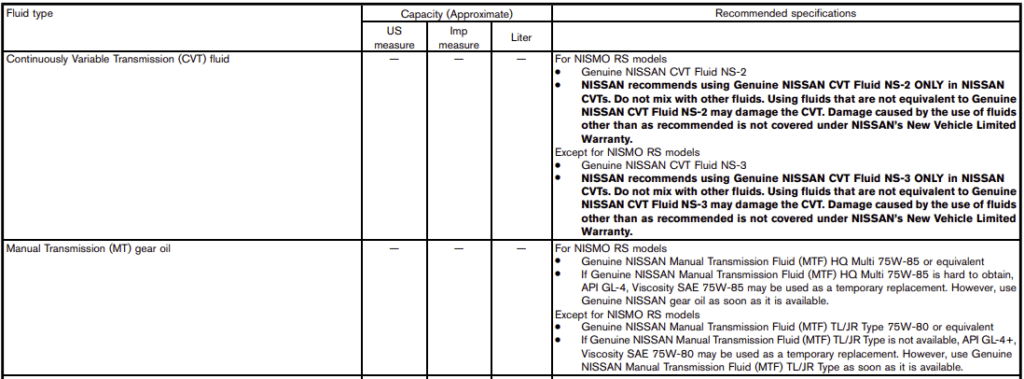The Nissan Juke, with its unique style and compact dimensions, has been a distinctive presence on the roads since its introduction in 2010. A part of its charm lies in its spirited performance, which is largely orchestrated by a proficient transmission system nestled within its mechanical heart.

However, like any well-oiled machine, the Nissan Juke’s transmission demands a particular kind of sustenance to continue functioning optimally – the transmission fluid. This vital fluid ensures smooth gear shifts, reduces friction among moving parts, and aids in keeping the transmission system cool, thereby promising a longer lifespan and consistent performance.
Understanding the right type and capacity of transmission fluid for your Nissan Juke is imperative to ensure a harmonious relationship between the vehicle’s engine and its transmission system. The transmission fluid acts as a medium through which power is transmitted from the engine to the wheels.
The wrong type or insufficient amount of fluid can lead to erratic shifting behavior, overheating, and severe transmission damage in the long run.
2011 2012 2013 2014 2015 2016 2017 Nissan Juke Transmission Fluid Type And Transmission Fluid Capacity
Nissan Juke transmission fluid is designed to keep your car’s transmission operating smoothly. Over time, the fluid can become dirty and needs to be replaced. When choosing a new transmission fluid for your Nissan Juke, it’s important to choose one that is compatible with your car’s specific make and model.
- NISMO RS Models:
- Preferred Fluid: Genuine NISSAN Manual Transmission Fluid (MTF) HQ Multi 75W-85 or its equivalent.
- Temporary Alternative: In case of unavailability, API GL-4, Viscosity SAE 75W-85 can be used temporarily, but it’s advisable to switch to Genuine NISSAN gear oil as soon as possible.
- Other Models (Except for NISMO RS):
- Preferred Fluid: Genuine NISSAN Manual Transmission Fluid (MTF) TL/JR Type 75W-80 or its equivalent.
- Temporary Alternative: If the preferred fluid is not available, API GL-4+, Viscosity SAE 75W-80 may be used as a temporary substitute. However, reverting to the Genuine NISSAN Manual Transmission Fluid (MTF) TL/JR Type is recommended as soon as it is available.
These recommendations ensure that the right viscosity and quality of transmission fluid is used to maintain the performance and longevity of the transmission system, whether in NISMO RS models or other variations.

| Gearbox | Fluid capacity | Fluid type |
|---|---|---|
| S, SL, SV, Nismo manual FWD | 4 pints (1.9 liters) | NISSAN MTF TL/JR Type 75W-80 |
| Nismo RS manual FWD | 4 pints (1.9 liters) | NISSAN MTF HQ Multi 75W-85 |
| Nismo RS manual AWD | 4.2 pints (2 liters) | NISSAN MTF HQ Multi 75W-85 |
| S, SL, SV, Nismo CVT FWD | Total Fill 8.3 quarts (7.9 liters) | Nissan CVT NS-3 |
| Nismo RS CVT AWD | Total Fill 9.1 quarts (8.6 liters) | Nissan CVT NS-2 |
| Nismo RS CVT FWD | Total Fill 8.3 quarts (7.9 liters) | Nissan CVT NS-2 |
An Overview of Nissan Juke’s Transmission Variants
The Nissan Juke, renowned for its unique design and sporty performance, houses varying transmission systems across different models and years. Understanding the transmission variants and their functionalities can significantly aid Juke owners in ensuring proper maintenance and enjoying an optimal driving experience.
From 2011 to 2017, the Nissan Juke was engineered with different transmission options to cater to a myriad of driving preferences. During these years, the Juke was offered with Manual and Continuously Variable Transmission (CVT) options.
The manual transmissions were standard in the S, SL, SV, Nismo, and Nismo RS Manual FWD variants, while the CVT transmissions were incorporated in the S, SL, SV, Nismo CVT FWD, Nismo RS CVT AWD, and Nismo RS CVT FWD variants.
- Manual Transmission: Manual transmission, often celebrated for providing a more engaging driving experience, requires the driver to manually select and engage the gears. As a driver accelerates or decelerates, they must shift gears up or down respectively to maintain the engine’s efficiency and performance.
The Nissan Juke’s manual transmission variants are equipped with a clutch pedal, which needs to be depressed to disengage the transmission from the engine, allowing for smooth gear shifts. - Continuously Variable Transmission (CVT): On the other hand, the Continuously Variable Transmission (CVT) eliminates the necessity for manual gear shifts by utilizing a seamless gear ratio system. Instead of fixed gears, CVT employs a pulley system that allows an infinite number of ratios between the engine and the wheels, ensuring optimal engine performance under different driving conditions.
The CVT in the Nissan Juke provides a smoother, more fuel-efficient driving experience, which makes it a preferable choice for those who prioritize ease of driving and fuel economy over the manual engagement of traditional transmissions.
The Role of Transmission Fluid
The transmission system is undeniably one of the critical components in any automobile, and the Nissan Juke is no exception. The transmission fluid serves as the lifeblood of this system, ensuring its optimal functionality and longevity. Understanding the role of transmission fluid is key to maintaining the performance and efficiency of your Nissan Juke.
- Lubrication: The primary function of transmission fluid is to provide lubrication to the gears, bearings, and shafts within the gearbox. By reducing friction and preventing wear, the fluid ensures smooth operation and extends the lifespan of the transmission components.
- Cooling: As the transmission operates, it generates heat due to friction. The transmission fluid absorbs this heat and dissipates it as it circulates through the cooling system, thus preventing overheating and potential damage.
- Cleaning: Transmission fluid contains detergents that help in keeping the internal parts of the transmission clean by breaking down and removing any debris or contaminants.
- Hydraulic Functionality: In automatic and CVT transmissions, the fluid acts as a hydraulic fluid that helps in the operation of the transmission’s hydraulic systems, enabling gear shifts to occur seamlessly.
- Sealing: The fluid helps in maintaining the seals within the transmission, ensuring that they remain in good condition and continue to perform their sealing function effectively.
Importance of Adhering to Manufacturer-Recommended Fluid Types and Capacities
- Optimal Performance: Adhering to the manufacturer-recommended transmission fluid types and capacities ensures that the transmission operates at its best. The specific fluid types are formulated to meet the performance requirements of the Nissan Juke’s transmission system.
- Warranty Compliance: Following the manufacturer’s guidelines on transmission fluid types and capacities is crucial for maintaining the vehicle’s warranty. Using incorrect fluid types or incorrect quantities can void the warranty and result in costly repairs.
- Longevity: Utilizing the recommended transmission fluid types and adhering to the specified capacities can significantly extend the transmission’s lifespan. It ensures that all components are adequately lubricated, cooled, and functioned as intended.
- Prevention of Damage: Using incorrect transmission fluid types or incorrect fluid capacities can result in severe damage to the transmission. It can lead to inadequate lubrication, overheating, and even complete transmission failure.
- Cost-Efficiency: In the long run, adhering to manufacturer guidelines on transmission fluid can save substantial amounts of money by preventing unnecessary repairs and ensuring the transmission operates efficiently, thereby contributing to better fuel economy.
Encountering and Tackling Common Transmission Hurdles
Despite the robust engineering behind the Nissan Juke’s transmission system, like all mechanical components, it’s prone to wear and tear, and might manifest some common issues over time. Recognizing these issues early and addressing them promptly can prevent more severe problems down the line.
- Slipping Transmission: A slipping transmission is a common issue where the transmission doesn’t engage properly or shifts gears unexpectedly. This can feel like the car is struggling to accelerate or behaving unpredictably.
- Delayed Engagement: If your Nissan Juke is taking too long to move from the park or neutral position to drive, it’s likely experiencing delayed engagement. This could be due to low transmission fluid or other internal issues.
- Fluid Leaks: Transmission fluid leaks are common and can lead to serious transmission problems if not addressed. Regularly checking for leaks and maintaining the correct fluid level can help prevent this.
- Unusual Noises: Hearing unusual noises like whining, humming, or clunking may indicate a problem within the transmission. These noises should not be ignored and should be checked by a professional.
- Check Engine or Transmission Warning Light: Modern vehicles like the Nissan Juke are equipped with sensors that trigger warning lights when they detect issues in the transmission system. Any warning light should be investigated promptly.
Troubleshooting Tips
- Regularly Check Transmission Fluid: One of the easiest preventive measures is regularly checking the transmission fluid level and quality. Ensure it’s at the correct level and doesn’t have a burnt smell or contain any metal shavings.
- Change Transmission Fluid as Recommended: Adhering to the manufacturer’s recommendations for changing transmission fluid is crucial. Old or contaminated fluid can cause transmission performance issues.
- Avoid Excessive Heat: Overheating is a common cause of transmission problems. Avoiding situations that can lead to overheating and ensuring your cooling system is functioning properly can extend the life of your transmission.
- Annual Transmission Check-Up: Have a transmission specialist conduct a thorough check-up of your transmission system at least once a year to catch and address issues before they escalate.
- Avoid Overloading Your Vehicle: Overloading your vehicle can strain the transmission, leading to premature wear. Always adhere to the manufacturer’s load specifications.
- Get Professional Help: If you notice any unusual behavior in your transmission, it’s wise to get professional help rather than attempting to fix it yourself, as incorrect repairs can exacerbate the issue.















